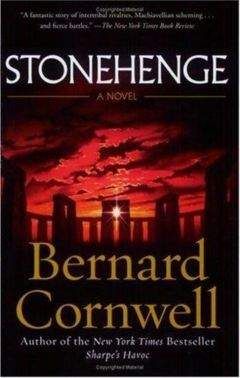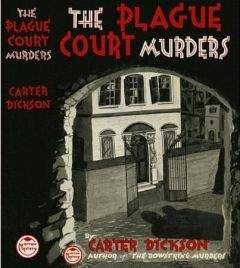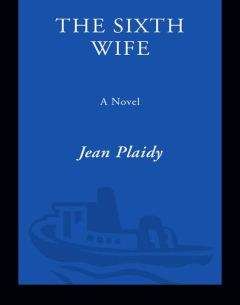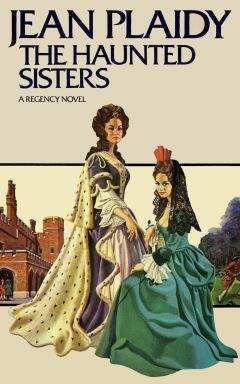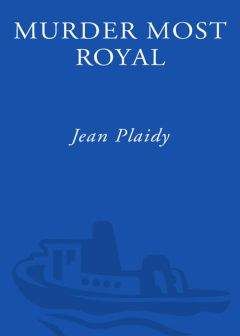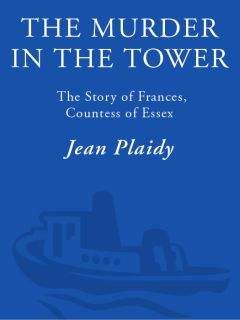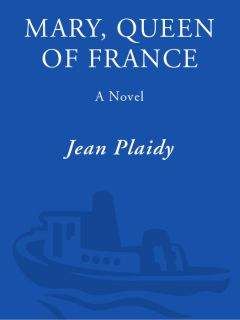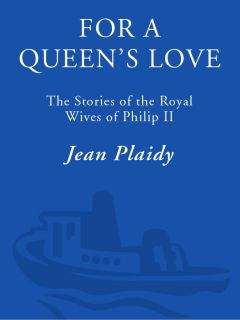Jean Plaidy - To Hold the Crown: The Story of King Henry VII and Elizabeth of York
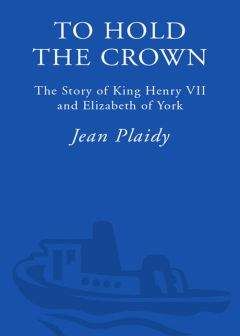
Скачивание начинается... Если скачивание не началось автоматически, пожалуйста нажмите на эту ссылку.
Жалоба
Напишите нам, и мы в срочном порядке примем меры.
Описание книги "To Hold the Crown: The Story of King Henry VII and Elizabeth of York"
Описание и краткое содержание "To Hold the Crown: The Story of King Henry VII and Elizabeth of York" читать бесплатно онлайн.
But Elizabeth Woodville would have to realize that the King’s mother was in charge of the King’s household, and as the most important part of it at this time was the lying-in chamber, Margaret would be in absolute control.
“It is well,” she said, “that we came to Winchester early as it is the King’s wish that the child should be born here.”
“I should have preferred Windsor,” commented Elizabeth Woodville.
“It is of course the King’s wish that must prevail in these matters. Great King Arthur built this castle.”
“Is said to have built it,” interrupted Elizabeth.
“King Arthur is an ancestor of the King.”
“Oh my dear Countess, there are so many who claim they have descended from Arthur.”
“That may be but the King has in fact. He always had a great admiration for King Arthur. When he was a boy he was constantly reading of his deeds and those of his knights; and when he knew he was about to become a father he said, ‘I wish my son to be born in Arthur’s castle.’ That is why the Queen is here.”
“We hope it will be a son. One can never be sure.”
“Your daughter will be fertile, I have no doubt. You yourself have been.”
Elizabeth smiled complacently. She felt superior to the Countess in that respect. For although Margaret might have had three husbands she had produced only one child. True, that child had become King of England, but so had Elizabeth’s tragic little Edward the Fifth—if only for a few months before he retired into mysterious obscurity.
“There should be some light in the lying-in chamber,” she said.
“One window has not been fully covered. That will give her all the light she needs,” retorted the Countess.
Elizabeth was irritated. When she considered the number of times she had given birth she would have thought she knew more about it than the King’s mother.
“When I think of my little son . . . born in Sanctuary . . .”
“I know, but the King’s son will soon be born in Winchester Castle and that is what we must concern ourselves with.”
“My lady, is it not unlucky to talk of the sex of the child with such certainty?”
“I do not think so. I feel sure it is a boy the Queen carries. A little boy . . . who is so impatient to be born that he cannot wait his full time.”
“I trust Elizabeth will be all right. I do not like premature births. I almost wish that it was not premature . . . that . . .”
The Countess regarded her with horror. “Do you mean that you would have the King forestall his marriage vows . . . ?You cannot mean . . . ?”
“Oh no . . . no . . . I am sure he would never do that. But if the baby comes before its time, will it not be a little . . . delicate?”
“It is sometimes so, but Elizabeth is a healthy girl. I doubt not that if he should be born weakly we shall soon have him strong.”
“Well, she is young. This will be the forerunner of many it is to be hoped.”
Thus the two women talked while they waited to hear the first cry of the child. Elizabeth Woodville was hiding her apprehension. Her daughter had suffered recently from the ague and she was more worried than she would admit because the birth was premature. If Elizabeth died . . . No, she would not think of that. She had had too much bad luck with her beloved children. Elizabeth would survive. Elizabeth was the hope of the House of York. If she died, and the child with her, would the conflict begin again? The Yorkists would be ready to drive the Lancastrian from the throne. She knew that in some circles Henry was referred to as “the impostor” and it was only this marriage with the daughter of the House of York which made him acceptable. Once the child was born—and pray God it should be a boy—that alone would seal the pact.
“Elizabeth, my darling daughter,” she prayed, “live . . . live and give us a healthy boy . . . for the sake of the country, for the sake of us all.”
The Countess of Richmond was less confident than she appeared to be. Premature births were dangerous and it could not possibly be anything else but a premature birth. Elizabeth would never have taken a lover and Henry would never have forestalled his marriage vows. No . . . no . . . the child was coming a month before it was due. It had happened before. The main thing was that it should live and that Elizabeth should go on to give more children to the country. This conflict between York and Lancaster had to end. For thirty years—on and off—those wars had persisted. The strength of King Edward the Fourth had held them at bay but it had been seen how easily they had broken out when he had died. And now . . . Lancaster was in the ascendancy but the Yorkists were content because though the King was a Lancastrian the Queen was of the house of York. An ideal settlement, but it must stay firm. The Queen must remain the Queen and there must be a child.
It had all seemed hopeful until the Queen began to give birth prematurely.
If she died, thought the Countess, and if the child died . . . what then?
She had been watching Cecilia. The girl was comely—all Edward the Fourth’s daughters were beauties, with that magnificent golden hair inherited from the mother. It was hardly likely that they could be other than handsome with parents who had been generally proclaimed as the best-looking man and woman in the country.
If Elizabeth died could Henry marry Cecilia . . . ? It would be tricky but it had always been the Countess’s custom to be prepared for all eventualities.
Meanwhile the Queen was awaiting the birth of the child. The pains were intermittent now. She felt very ill and wondered if she were going to die. She had been unprepared when the evidence of the child’s imminent arrival became apparent and she was very alarmed. It could not be yet. It was not due for another month. They had brought her to this darkened chamber and she longed for more light, but it was against royal etiquette, her mother-in-law had said—and it was the Countess who made the rules in this household.
The King deferred to the Countess and Elizabeth must defer to the King. She was not sure whether she loved her husband. He was not what she had imagined him to be. When the marriage had been suggested she had thought of him as a hero of romance. He was coming to protect her from her Uncle Richard—not that she had ever been greatly in fear of her uncle. She remembered his visiting her father when he was alive and what affection there had been between the two of them, though Uncle Richard had been quite different from her big jovial exuberant father. Quiet, retiring, speaking very little, being intensely serious—that was Uncle Richard. Yet Anne Neville had loved him; and Anne had been a good friend to her.
The truth was that she was in awe of her husband. He had shown her affection and stressed that he was delighted with his marriage, but there was something she did not understand about him, something withdrawn . . . aloof. Behind those eyes were secrets she would never discover. Perhaps, she thought, it was better that she did not.
She was overanxious that she should produce a healthy boy because that was her duty. It seemed, looking back on her life, that it was what she had been born for. All her life she had been buffeted, it seemed, from this one to that. . . . First one marriage was important . . . then another. At one time she had been offered to the son of Margaret of Anjou. That came to nothing because he was affianced to Anne Neville when Anne’s father, the Kingmaker Earl of Warwick, turned his coat and went over to Margaret of Anjou, deserting his old friend and ally Elizabeth’s father. Later she was destined for the Dauphin of France. What a grand opinion she had had of herself then. So had her mother, who had insisted that she be called Madame La Dauphine throughout the Court.
Then of course the King of France had decided to give his son to another bride and that, it was said, so shattered Edward the Fourth that it was one of the causes of his death. And eventually here she was . . . Queen of England.
At least that side of her life was settled. She would like to live quietly now . . . at peace . . . with many children to occupy her days. That was what she wanted and for once it coincided with most other people’s wishes for her, so perhaps there was a chance of its coming to pass.
Perhaps she was wrong to be afraid of her cold-eyed husband. Perhaps she felt so because having lived close to a father like Edward the Fourth, she had expected to have a husband like him—full of good humor, full of laughter, handsome, dressed extravagantly, charming everyone with his smiles and well-chosen words. She remembered an occasion when the Lord of Grauthuse visited the Court and her father wished to do honor to him. There had been a great many entertainments and at one of the balls her father had led her out onto the floor and danced with her. She must have looked tiny beside his great bulk, but how exalted she had felt—particularly when the dance was over and he had lifted her up before them all and kissed her. That must have been one of the happiest moments in her life. She remembered her mother, so beautiful that she seemed like a being from another world, looking on at the scene and smiling benignly—oh yes indeed, the happiest little girl in all the Court . . . in all the world perhaps. But one quickly learned that happiness was a fleeting moment . . . here . . . and gone . . . but it did leave something behind . . . a memory to bring out now and then and glory in.
Now, lying in her bed in this darkened room with so many people about her, listening to the whispering voices, waiting for the next bout of pain, events from the past would keep coming into her mind.
She was thinking of her young brother Edward’s birth, which had taken place on a dark November day in the Sanctuary at Westminster where she with her mother and her sisters were sheltering from their enemies. She would never forget the exultation when it was learned that the new baby was a boy. Her mother had said: “This is the best news the King could have. Now he will regain his throne.” She remembered the little boy’s baptism in that grim place. There was no royal ceremony then, and yet that little boy was the King’s son, the heir to the throne.
Little Edward, she thought. Where are you now? Where is my brother Richard? Little Edward, true King of England, what happened to you?
One must not think of the boys, her mother had said. They must have died. . . . It is the only explanation.
Of course it was the only explanation, for if they lived and were not illegitimate as her Uncle Richard had proclaimed them to be, then Henry had no right to the throne and she was not the true Queen. And he must declare them legitimate for how could the King of England marry a bastard, for she must be one if her brothers were.
One certainly must not think of such things, particularly when one was about to bring a child into the world.
But the thoughts would keep intruding . . . terrible thoughts. There had been a rumor when her aunt, Queen Anne, wife of Uncle Richard was near to death that she, Elizabeth, and the King had conspired together to poison her. It was monstrous. It was absurd. Her Uncle Richard had never shown anything but devotion toward his wife and never never had she, Elizabeth, considered marriage to him. Her own uncle! It was criminal. And all for the sake of being Queen of England!
He must have felt the same horror for when the Queen died he sent her away from Court, and she had been more or less a prisoner at his castle of Sheriff Hutton in the North because he knew that there had been a secret betrothal to Henry Tudor.
That was her life—buffeted from one situation to another. Never was she consulted as to her wishes. They would do with her as best suited them. Received at Court one day, petted and pampered; and the next, banished to exile in what was more or less a prison.
At Sheriff Hutton she had been very much in the company of her cousin Edward, Earl of Warwick, who was the son of the Duke of Clarence—that brother of her father’s who had died in the Tower of London by drowning in a butt of malmsey. Poor Edward, his lot had been very sad. He had been only three years old when his father had died; his mother was already dead and poor little orphan that he was he was happy for a while in the care of his aunt Anne, then Duchess of Gloucester soon to be Queen of England. There had been a time, after the death of King Richard’s son, when Richard had thought to make young Edward his heir but the boy had continued at Sheriff Hutton, so that when Elizabeth had come there, she had found him already installed and a friendship grew up between them.
There they had been together at the time of the fateful battle of Bosworth, which was to change the lives of so many, among them the two who were virtually prisoners at Sheriff Hutton.
Elizabeth had come to Court to marry the new King; and the young Earl of Warwick for no other reason than he was a threat to the new King’s position was brought to London and lodged in the Tower.
Elizabeth was concerned for him; she would have liked to visit him, to ask her husband—or her husband’s mother—for what reason her young cousin Edward was confined in the Tower. What had he done—apart from being the son of the Duke of Clarence who might be said to have claim to the throne?
When she had broached the subject with Henry, that cold veiled look, which she was beginning to know so well, had come into his eyes.
“He is best there,” he had said with a note of finality in his voice.
As the Countess of Richmond had said: “The King will know how best to act.”
But it is wrong . . . wrong . . . she thought . . . to imprison him just because . . .
She tried not to think beyond that, but the thoughts would persist: Just because he has a greater claim to the throne than Henry Tudor. . . . After the sons of Edward the Fourth there is the son of his brother George Duke of Clarence. . . . But where are the sons of Edward the Fourth? Where are my little brothers Edward and Richard?
It was amazing how her thoughts came back and back to that question.
But the pains were starting again, and there was nothing else she could think of.
The King was out hunting when he heard the disturbing news that the child was on the point of being born. He was alarmed. It was too soon. Not only must this child be a boy, he must live. He was sure that if this could come about he would be secure upon the throne.
It meant everything to him. He believed he had all the gifts necessary to kingship. He believed he knew what England needed to make her a great country and he could bring this about. He hated war, which he was sure brought little profit to any concerned in it. He had seen what the Hundred Years War and the Wars of the Roses had done to England. He wanted peace. He wanted trade. Edward the Fourth had seen the virtue of that and it was obvious that the country has prospered under him. He wanted to encourage the arts for he felt they enriched a nation; he wanted to accumulate wealth, for if the coffers of the exchequer were fuller a country lost its vulnerability and the money could be used to encourage commerce and exploration, which would result in new markets; he could enrich the country through architecture and learning; the taxes enforced on the people should be used for its prosperity, not squandered on useless wars and other futile extravagances.
Подписывайтесь на наши страницы в социальных сетях.
Будьте в курсе последних книжных новинок, комментируйте, обсуждайте. Мы ждём Вас!
Похожие книги на "To Hold the Crown: The Story of King Henry VII and Elizabeth of York"
Книги похожие на "To Hold the Crown: The Story of King Henry VII and Elizabeth of York" читать онлайн или скачать бесплатно полные версии.
Мы рекомендуем Вам зарегистрироваться либо войти на сайт под своим именем.
Отзывы о "Jean Plaidy - To Hold the Crown: The Story of King Henry VII and Elizabeth of York"
Отзывы читателей о книге "To Hold the Crown: The Story of King Henry VII and Elizabeth of York", комментарии и мнения людей о произведении.






